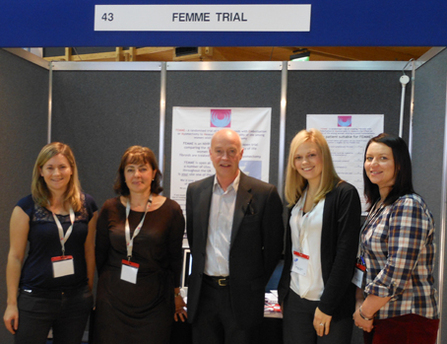
The National Institute for Health and Clinical Excellence (NICE) clinical guidelines for uterine artery embolization state that more treatment options are required for women with uterine fibroids. The FEMME trial (A randomised trial of treating fibroids with either embolization or myomectomy to measure the effect on quality of life, among women wishing to avoid hysterectomy) sponsored a booth at the British Society of Interventional Radiology’s (BSIR) Annual Meeting (14–16 November, Bournemouth, UK) and is currently recruiting patients in order to examine the effectiveness of uterine artery embolization in comparison to myomectomy in the treatment of symptomatic fibroids.
In an interview with Interventional News, Jon Moss, consultant interventional radiologist, Gartnavel General Hospital, Glasgow, UK, spoke about the intended outcomes for the trial and the drive for patient recruitment.
What is the rationale for doing the study?
NICE guidance on uterine artery embolization was updated in October 2010. Normal arrangements are now in place for uterine artery embolization. However, NICE stated: “Patients contemplating pregnancy should be informed that the effects of the procedure on fertility and on pregnancy are uncertain. NICE encourages further research […] particularly for women wishing to maintain or improve their fertility.” Therefore FEMME is addressing the need for more research stipulated by NICE. At the moment women have a choice of either myomectomy or uterine artery embolization if they want to preserve their uterus. What they are offered and then choose is not based on sound evidence. In some centres they are only being offered myomectomy in others, perhaps, only uterine artery embolization. Women need clear evidence as to which procedure to choose based on level one evidence. There is particular interest in the impact, if any, of these two procedures on future fertility. The primary endpoint of the trial is quality of life but the FEMME trial will also investigate the secondary outcomes including adverse event rate and cost effectiveness.
Do you have any current updates from the trial?
Recruitment stands at 30 and we need 650 so we need to boost recruitment. We have 27 open and active centres in the UK with another 20 awaiting regulatory approval. There has been one pregnancy to date in the uterine artery embolization arm.
If you would like to get involved in FEMME then please contact the FEMME trial co-ordinator, William McKinnon, by emailing [email protected] or calling 0121 414 8335.










